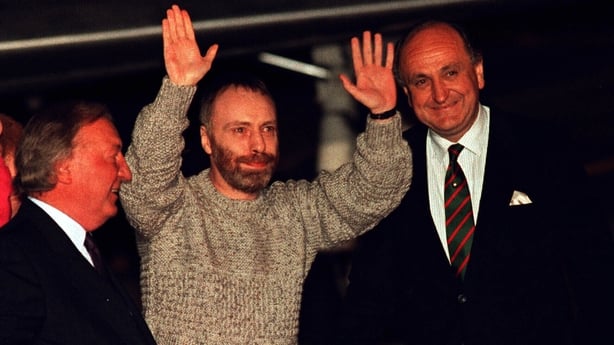By David McCullagh and Fiachra Ó Cionnaith
The Israeli embassy in Dublin was in the news before Christmas, with the announcement by the Israeli government that it is to be closed in protest at what it called Ireland’s “anti-Israel approach”.
However, newly released government files show that 34 years ago, Israel was lobbying strongly for the opening of an embassy in Dublin – with the charge being led by the young deputy foreign minister Benjamin Netanyahu now the country’s Prime Minister.
On a visit to Dublin in February 1990, Mr Netanyahu met Gerry Collins, the minister for foreign affairs, who said there had been “a natural feeling of sympathy towards Israel among the Irish people”.
He would prefer that to still be true, but that “cases of Irish troops being brought home dead from Lebanon hadn’t helped” Israel’s image in Ireland.
Mr Netanyahu strongly urged Collins to agree to an exchange of embassies between the two countries.
Pointing out that Israel would soon have embassies in all of the countries of eastern Europe, Mr Netanyahu said he didn’t want Ireland “to lag behind either in the intensity or intimacy of diplomatic contacts with Israel”.
Israel’s embassy in Ireland opened in December 1993, but in May 2024 now Prime Minister Netanyahu, recalled Ambassador Dana Erlich for “consultations” after Ireland recognised the state of Palestine and in mid-December, it was announced that the embassy was to close permanently.
The State Papers have plenty of other examples of how times have changed in the last three decades.
Take the communications revolution as one example.
Read more:
US put under pressure over Irish visas ahead of World Cup
State Papers cover serious and bizarre topics
Irish govt was suspicious of Wright’s prison treatment
Threats to poison English water supplies taken seriously
Six more things we learnt from the State Papers
People whose loved ones emigrate to Australia now know that their friends or relatives are only a mobile call or video chat away.
However, just 30 years ago the reality of starting a new life ‘Down Under’ was very different, with Department of Foreign Affairs officials receiving regular letters seeking assistance in getting in touch with Irish citizens on the other side of the world.
One case involves a man who was living and working in Canberra for a number of years.
The department note read that his relatives were now “urgently” trying to find a way to get in touch as “his mother is very ill”.
A second case involved a long-term emigrant in his 70s, originally from Co Kerry, who had been knocked down and was not expected to live.
Australian police contacted the Department of Foreign Affairs to help track down his relatives back home.
A record noted that as the phone book had “two columns” of people with the same name this would take some time.

Other cases that may remind older generations of the not-too-distant past and baffle those a little younger include one man who lost “his traveller’s cheques in addition to the numbers of the cheques” while in Australia and was also unable to get in touch with his parents back in Ireland.
The young man contacted the department to ask officials to inform his local bank that he needed to cancel the cheques, a potentially complicated situation in the early 1990s which can be rectified with the click of a phone today.
Another case involved the family of a young Irish woman living in Queensland who had left her job in a hotel.
Without another way of getting in touch with her for three weeks over Christmas and New Year’s, her family contacted the Department for “help in ascertaining her whereabouts up to December”.
Officials contacted friends working in the hotel to ask them to pass on a message for her to contact her worried family.
A follow-up note confirmed the young Irish emigrant had received the message and would call her family immediately.
The newly released archives also contain revelations about the efforts to release Irish hostage Brian Keenan from captivity in Lebanon, the opposition of successive governments to the establishment of an arms industry in this country, the importance attached to American fundraising by Sinn Féin in the early days of the peace process, and the serious row with government over IRA links to criminal activity a decade later.
And there’s a range of lighter stories, from Hollywood’s “moral vacuum”, to the question of just who is buried in Drumcliffe graveyard.
[Based on documents in 2024/52/118 and 2024/52/404]
